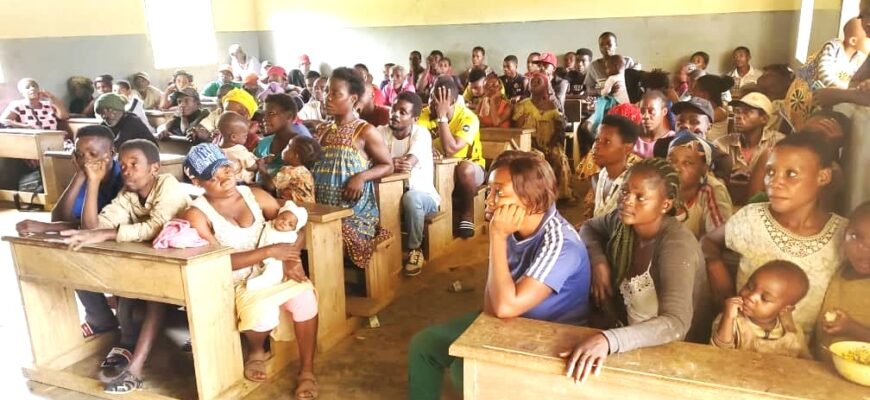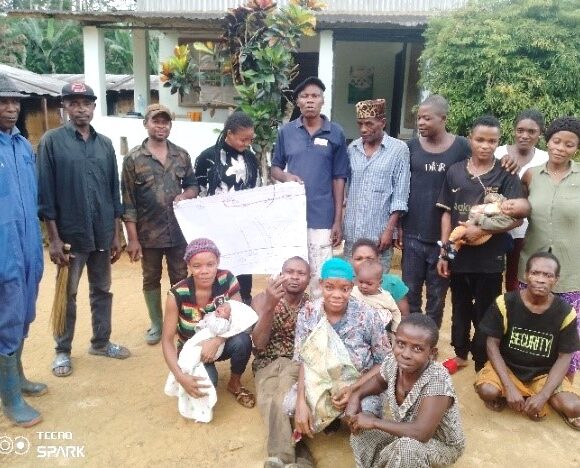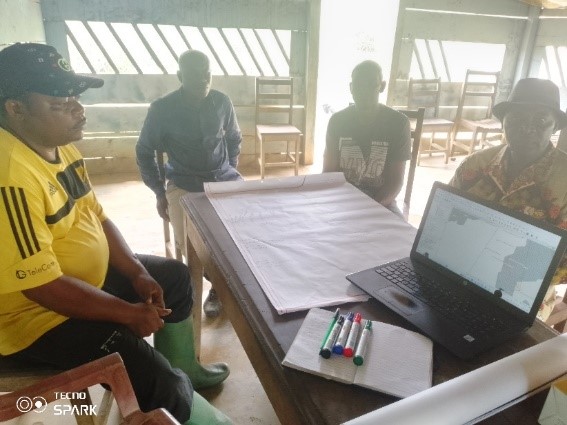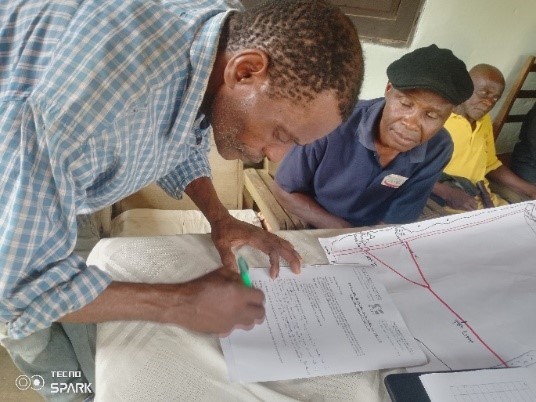FEDEC and FIDA Collaboration: Establishment and Sustainable Management of the Community Forest

In June 2024, a mission took place in Ngoyang as part of the project “Establishment of an indigenous community forest to strengthen their resilience to climate change”. During this mission, the Bagyeli and Bakolas indigenous communities met the Ewondo populations of the Nkoambpoer and Ngoyang villages. Together, they fostered dialogue, shared their traditional knowledge of the territory and defined the limits of the community forest in a consensual manner. The result: a collaborative map of this forest, initiating a promising project for a sustainable future. Together, let’s build a sustainable future, let’s stay connected for the future!
(Français) RECRUTEMENT D’UN/E CONSULTANT/E EN CHARGE DE LA REVISION DES STATUTS, DU REGLEMENT INTERIEUR, DE LA REFORMULATION DE LA VISION, DES MISSIONS, DES INTENTIONS STRATEGIQUES, DES OBJECTIFS OPERATIONNELS AINSI QUE DU PLAN CADRE A LONG TERME, EN VUE DE L’EFFICACITE ORGANISATIONNELLE DE LA FEDEC

Free treatment campaign for patients organized by FEDEC in partnership with the organization ASCOVIME

 Improving the access of indigenous populations to health care is the main objective of the health component of the Plan for Vulnerable Indigenous Peoples (PPAV). To achieve this objective, FEDEC collaborates with health institutions and organizes advanced strategy missions in the project areas. It is in this context that the Foundation, in partnership with the association ASCOVIME, organized a free treatment campaign for patients in Bipindi.
Improving the access of indigenous populations to health care is the main objective of the health component of the Plan for Vulnerable Indigenous Peoples (PPAV). To achieve this objective, FEDEC collaborates with health institutions and organizes advanced strategy missions in the project areas. It is in this context that the Foundation, in partnership with the association ASCOVIME, organized a free treatment campaign for patients in Bipindi.
The campaign was held on July 22, 2021 at the Bipindi District Medical Center with the main objective of providing free health treatment to the populations around the Bipindi area.
During this campaign, nearly 600 people received treatment, i.e. 120 Bakola / Bagyeli and nearly 480 Bantus. 15 pregnant women received kits (baby clothes, body cleansing milk, soap, shampoo, shower gel, etc). A total of 25 people underwent surgery for hernias, cysts and a tumor in their leg. 220 people suffering from eye problems were treated, of which around 100 benefited from medical glasses. 268 other people suffering from various diseases such as toothaches, malaria, headaches, stomach pain, body pain, back pain, diarrhea, skin problems etc. were all treated.
CAMPO MA’AN NATIONAL PARK: NEW ECOLOGICAL MONITORING SYSTEM

 In order to ensure regular monitoring of the species in the park, Africa Wildlife Foundation has opted for the use of new technologies. After a sampling plan of the protected area, 50 cameras were deployed in the field for a period of 30 days. Of the 50 cameras deployed, 40% were granted by Concordia University. During this period, 19 different species were recorded by camera at particular sites, including all key species such as elephants, gorillas, mandrills, chimpanzees and pangolins.
In order to ensure regular monitoring of the species in the park, Africa Wildlife Foundation has opted for the use of new technologies. After a sampling plan of the protected area, 50 cameras were deployed in the field for a period of 30 days. Of the 50 cameras deployed, 40% were granted by Concordia University. During this period, 19 different species were recorded by camera at particular sites, including all key species such as elephants, gorillas, mandrills, chimpanzees and pangolins.
Access to drinking water for children in Ngoyang public school


In order to supply the populations of Ngoyang with drinking water, FEDEC and the Otélé Drinking Water Project (pep) have collaborated with a view to setting up a drinking water well at the public school of Ngoyang, located in Ngoyang District in the Ocean Department.
The inauguration of the work took place on May 12, 2021. A ceremony chaired by the Executive Director of the Foundation, Mrs. EDOA Anne Virginie in the presence of the Director of the PEP, the parish priest of Ngoyang, the President of the Management Committee of the locality household (COGEFON) and the indigenous communities of Ngoyang. The speeches phase started with a word of welcome from the President of COGEFON. The Director of the PEP then took the floor to explain the specific context of the construction of this structure. The honor went to the Director of FEDEC to bring out the first drop of water in front of an indigenous community visibly moved to have a point of drinking water very close to them. The parish priest of Ngoyang blessed the work to close the ceremony.
Fight against COVID-19: FEDEC and GEF / SGP / UNDP alongside the Bakola / Bagyeli communities

 A financing agreement was signed between the Foundation for the Environment and Development in Cameroon and the GEF Small Grant program for the implementation of the project entitled “Strengthening the resilience of territories and indigenous communities Bakola / Bagyeli facing the effects of COVID-19 ”. The said funding agreement in the amount of US $ 33,879 will help strengthen the access of men and women in Bakola / Bagyeli communities to information on COVID-19 through culturally appropriate means. Community radios in the area will thus be called upon to produce and broadcast regular awareness programs against this pandemic. The project will also popularize information on COVID-19 through posters, leaflets and picture boxes. In addition to awareness raising, the funding provided will help promote socio-ecological resilience and strengthen food security and the cultural identity of communities. Emphasis will therefore be placed on training communities to set up environmentally friendly agroforestry systems. Another articulation of the intervention will consist in providing information on the state of biodiversity in the implementation area.
A financing agreement was signed between the Foundation for the Environment and Development in Cameroon and the GEF Small Grant program for the implementation of the project entitled “Strengthening the resilience of territories and indigenous communities Bakola / Bagyeli facing the effects of COVID-19 ”. The said funding agreement in the amount of US $ 33,879 will help strengthen the access of men and women in Bakola / Bagyeli communities to information on COVID-19 through culturally appropriate means. Community radios in the area will thus be called upon to produce and broadcast regular awareness programs against this pandemic. The project will also popularize information on COVID-19 through posters, leaflets and picture boxes. In addition to awareness raising, the funding provided will help promote socio-ecological resilience and strengthen food security and the cultural identity of communities. Emphasis will therefore be placed on training communities to set up environmentally friendly agroforestry systems. Another articulation of the intervention will consist in providing information on the state of biodiversity in the implementation area.
This project will contribute to the achievement of the Sustainable Development Goals relating to the eradication of poverty, the elimination of hunger, the promotion of the well-being of all and access to water and sanitation.
Awareness campaign for indigenous communities against COVID-19


FEDEC, in partnership with the Grand Zambi health centre, the BIPINDI Assisted Medical Centre and the Ngovayang hospital, has launched a massive awareness campaign on compliance with barrier measures to prevent the spread of COVID-19 within B/B indigenous communities. The said campaign ran from March 29 to April 9, 2021 and reached 227 people including 136 women and 91 men in 24 B/B communities. In addition to awareness messages, 465 washable mufflers and 550 pieces of soap were distributed to the communities. The medical teams tested 43 people. No positive cases were recorded. Other medical acts were performed during these raids as well. These included, among other things, prenatal consultations carried out on 23 pregnant women. Vaccines against tuberculosis, polio, yellow fever, measles, tetanus, and diphtheria were administered to 89 children. 49 people were dewormed. Treatment was given to 186 people suffering from various illnesses.









Recent CommentsRecents Comments